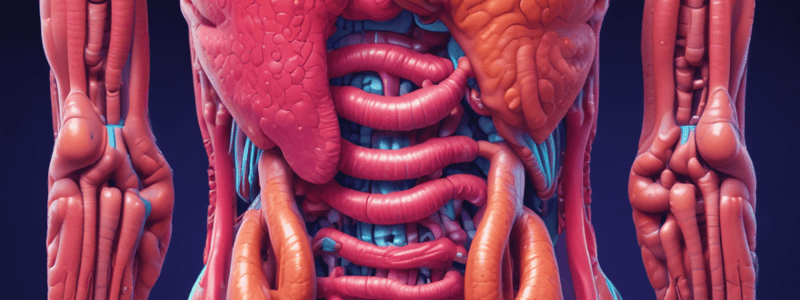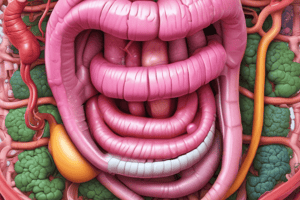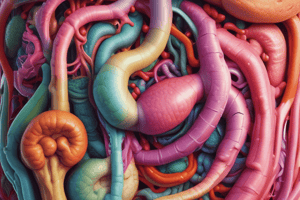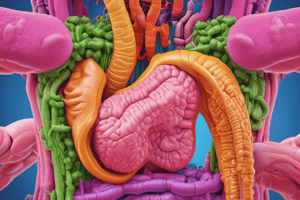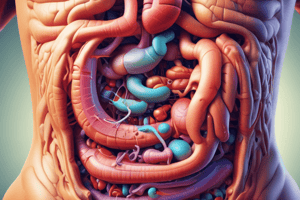Podcast
Questions and Answers
Welches Organ im Verdauungssystem ist hauptsächlich für die Aufnahme von Nährstoffen aus der Nahrung verantwortlich?
Welches Organ im Verdauungssystem ist hauptsächlich für die Aufnahme von Nährstoffen aus der Nahrung verantwortlich?
- Zwölffingerdarm (correct)
- Magensaft
- Leber
- Dickdarm
Welche Funktion hat die Speiseröhre im Verdauungssystem?
Welche Funktion hat die Speiseröhre im Verdauungssystem?
- Absorption von Nährstoffen
- Zerkleinern von Nahrungsmitteln
- Transport von Nahrung zum Magen (correct)
- Produktion von Verdauungsenzymen
Was bewirken die Verdauungsenzyme im Magen?
Was bewirken die Verdauungsenzyme im Magen?
- Schützen die Magenwand
- Töten Bakterien ab (correct)
- Fördern die Wasserabsorption
- Fördern die Fettverdauung
Was sind die Funktionen der Darmzotten in der Dünndarmwand?
Was sind die Funktionen der Darmzotten in der Dünndarmwand?
Welcher Teil des Verdauungssystems ist hauptsächlich für die Wasser- und Elektrolytaufnahme verantwortlich?
Welcher Teil des Verdauungssystems ist hauptsächlich für die Wasser- und Elektrolytaufnahme verantwortlich?
Welche Funktion hat der Magensaft im Verdauungsprozess?
Welche Funktion hat der Magensaft im Verdauungsprozess?
Was ist die Hauptfunktion des Magens im Verdauungssystem?
Was ist die Hauptfunktion des Magens im Verdauungssystem?
Welche Rolle spielt der untere Ösophagussphinkter bei der Verdauung?
Welche Rolle spielt der untere Ösophagussphinkter bei der Verdauung?
Welche Funktion erfüllt die kleine Intestine im Verdauungssystem hauptsächlich?
Welche Funktion erfüllt die kleine Intestine im Verdauungssystem hauptsächlich?
Welche Art von Molekülen werden durch Lipasen hauptsächlich abgebaut?
Welche Art von Molekülen werden durch Lipasen hauptsächlich abgebaut?
Welche Struktur sorgt dafür, dass Nährstoffe aus der Nahrung direkt in den Blutkreislauf gelangen?
Welche Struktur sorgt dafür, dass Nährstoffe aus der Nahrung direkt in den Blutkreislauf gelangen?
Welches Organ ist hauptsächlich für die Produktion von Verdauungsenzymen verantwortlich?
Welches Organ ist hauptsächlich für die Produktion von Verdauungsenzymen verantwortlich?
Flashcards are hidden until you start studying
Study Notes
The Digestive System: An Overview
The digestive system plays a crucial role in breaking down food and extracting nutrients for our body's use. It is a complex system that includes various organs and processes, all working together to ensure we obtain the necessary energy and nutrients for our daily needs. This article will explore the main components of the digestive system, focusing on the stomach, intestines, esophagus, digestive enzymes, and absorption.
The Stomach
The stomach is a muscular bag that churns food and mixes it with gastric juices, which include hydrochloric acid and enzymes like pepsin. These substances help break down proteins and kill bacteria that may be present in the food. After being mixed and broken down, the food is squeezed through a sphincter into the first part of the small intestine, which is called the duodenum.
The Intestines
The small intestine is the primary site for the absorption of nutrients from the food we eat. It is divided into the duodenum, jejunum, and ileum. The walls of the small intestine are lined with finger-like projections called villi, which increase the surface area for nutrient absorption. The nutrients are absorbed into the bloodstream through the capillaries at the base of the villi.
The large intestine, also known as the colon, is responsible for absorbing water and electrolytes from the waste products of digestion. It also houses a large population of friendly bacteria that help break down undigested food and produce essential vitamins. The waste materials are then converted into feces, which are stored in the rectum until they are excreted through the anus.
The Esophagus
The esophagus is a muscular tube that connects the mouth to the stomach. When we swallow, the food passes through the esophagus, which contracts and relaxes to move the food downwards. A valve-like structure at the bottom of the esophagus, called the lower esophageal sphincter, ensures that the food does not flow back into the esophagus.
Digestive Enzymes
Digestive enzymes are proteins that break down complex molecules in food, such as carbohydrates, proteins, and fats, into smaller units that can be absorbed by the body. Some of the main enzymes involved in digestion include:
- Amylase: Breaks down starches into simple sugars
- Proteases: Break down proteins into amino acids
- Lipases: Break down fats into fatty acids and glycerol
- Lactase: Breaks down lactose into simpler sugars
- Maltase: Breaks down maltose into simpler sugars
- Sucrase: Breaks down sucrose into simpler sugars
These enzymes are produced by various organs and glands, such as the pancreas, liver, and intestines, and are essential for the proper functioning of the digestive system.
Absorption
Absorption is the process by which the body takes in the nutrients from the digested food. The small intestine is the primary site for this process, as it is lined with millions of finger-like projections called villi. These projections increase the surface area for absorption and are connected to a mesh of capillaries, allowing for the direct transfer of nutrients from the food into the bloodstream.
In summary, the digestive system is a complex network of organs and processes that work together to break down food, extract nutrients, and eliminate waste products. Understanding the functions of the stomach, intestines, esophagus, digestive enzymes, and absorption processes is essential for maintaining a healthy digestive system and overall well-being.
Studying That Suits You
Use AI to generate personalized quizzes and flashcards to suit your learning preferences.
